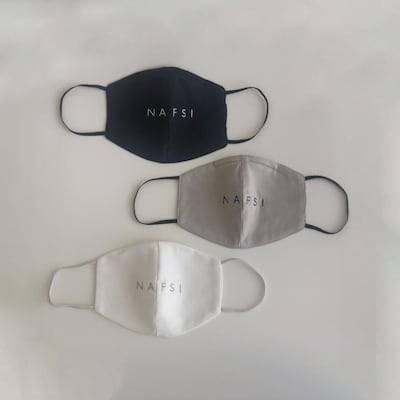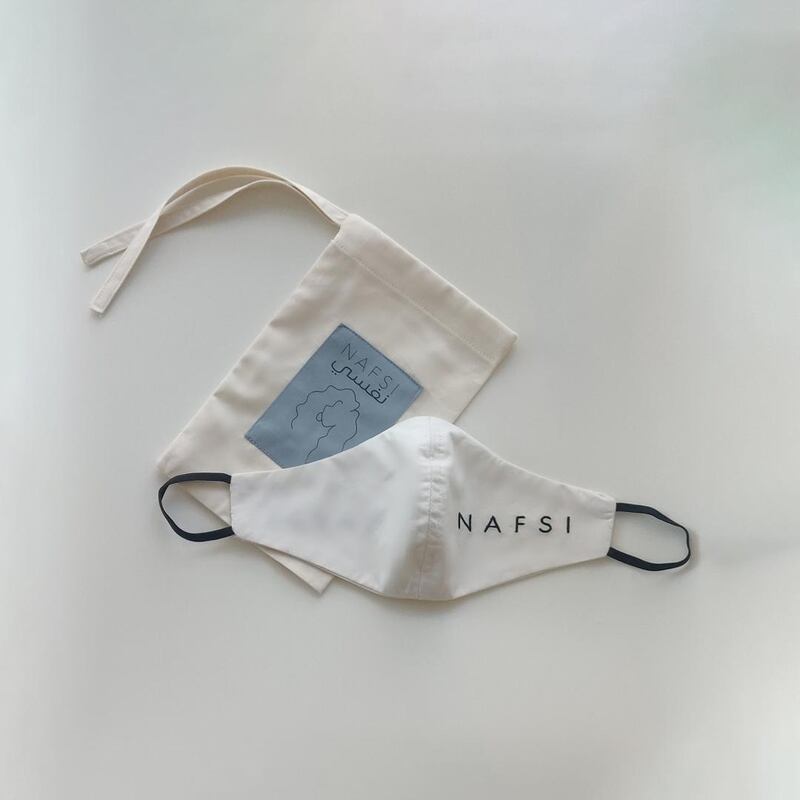When Celine Hajjar launched her sustainable fashion brand, which she’d been working on for three years, in January, she didn’t expect what would happen next.
Less than two months after she opened Nafsi, Dubai began closing down amid the coronavirus pandemic.
"It's been eye-opening, I would say," the Lebanese-Canadian entrepreneur tells The National. "You never know what's going happen tomorrow."
While launching her first business during a global crisis has undoubtedly been tough, Hajjar’s turned the challenge into an opportunity.
“It gave me a lot more time to focus on the brand and really put in exactly what I want to come out of it,” she explains.
What she really wants is for her label to have an impact on the fashion industry and in underdeveloped countries.
And one way she’s found to do that in these extraordinary circumstances is to release a collection of sustainable, organic, fair trade and upcycled face masks, of which a portion of the proceeds go to four charitable initiatives.
“I noticed a lot of fast fashion companies started selling masks, so I thought it’s a good time to give people a sustainable alternative,” she says.
“I didn’t want to stop there, though. Although we are dealing with a pandemic and there is so much to worry about, there are also so many day-to-day situations that we have to deal with that we never really do – such as underprivileged children in the underdeveloped world.”

With that in mind, she chose to work with a cause that champions transparency, and came across Gulf for Good.
“It’s such an awesome charity and there are quite a few projects they’re working on in 2020, so we decided proceeds from every mask will be dedicated to them,” she said.
Each mask costs Dh150 and Dh10 automatically goes towards the charity’s initiatives. This includes providing 13 days of clean drinking water to a child in Lebanon, upgrading classrooms and playgrounds in Uganda, sprucing up student dormitories in Peru and building schools in Nepal for the children of migrant workers.
Buyers can opt to add an extra donation at check-out.

“I wanted to do what I can to support people during the pandemic, but we should also reach out to those suffering, who might be impacted even more,” Hajjar says.
This extends to the materials used, and there are two types of masks you can choose from. One is made from organic Egyptian cotton from a fair trade provider. The company Nafsi works with also ensures women are paid equally to men and, if they decide to have children, that they are able to continue working.
The other type of mask is made using upcycled materials in partnership with Thrift for Good.
The designs are very minimalistic, but one element Hajjar is keen to highlight is the positioning of her brand’s name. “Nafsi is an Arabic word meaning ‘myself’, ‘my soul’, ‘my breath’. It’s all about doing things that are right for you and in turn for other people,” she explains.
“The word ‘nafsi’ on some of the masks is positioned over the mouth, for everyone to remember: ‘Let me protect my breathing and let me do this for me as I’m doing it for you as well’.”
The launch of her mask collection signalled a new direction for the business, but it’s one that's helped Hajjar emphasise the values underpinning her entrepreneurial mission. “It’s what we have to do for the greater good, for getting past this, and coming together as a nation to get over the pandemic,” she says.
On the e-store, you will also find a small selection of women’s accessories and dresses, as well as bed sheets. Hajjar has had to put the launch of any new collections on hold until after the summer, but shoppers will soon find a new line of unisex T-shirts and one-off upcycled pieces, as well as menswear.
All of her designs are very minimal, but inspired by her Canadian upbringing and Middle Eastern roots. “There is a lot of beautiful culture and style that goes into what people in the region wear,” she says. “I wanted to find a middle ground from my background and the Middle Eastern touch, which is how I decided to design this collection.”
Hajjar is also determined to make sure everything on her site is as sustainable as it can be. It was after spending a few years working in the fast fashion industry that she decided to move into this field.
“While I do have a passion for design, I was really sad to see how the fast fashion world was operating and that doesn’t sit right with me.
“It’s how I got into it, for the environmental and humanitarian aspects of it. We have a lot of fast fashion options, but that doesn’t mean they’re stylish options.
“And it doesn’t mean that if you’re sustainable, you can’t be stylish, too.”







